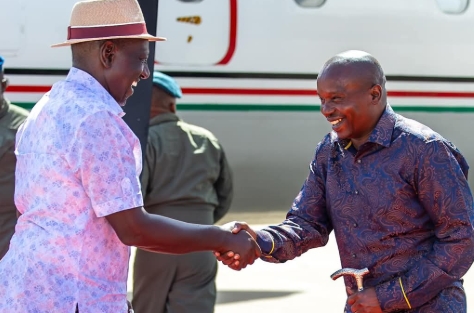- The Supplementary Budget II 2024/25 allocates an extra Ksh. 4.8 billion to the State House, President Ruto’s Office, and Deputy President Kindiki’s Office.
- Total government spending increased by Ksh.86.18 billion, covering the Executive, Legislature, and Judiciary.
- Despite promises of austerity, the budget expansion raises concerns over rising government spending, borrowing, and potential new tax burdens.
The National Treasury’s Supplementary Budget II 2024/25, tabled before Parliament, outlines significant budgetary increases for top government offices, including the State House and Executive Offices.
Key Allocations:
- State House Budget: Increased from Ksh.4.3 billion to Ksh.8.1 billion for cabinet affairs, salaries, national celebrations, operations, and maintenance.
- President Ruto’s Office: Received an extra Ksh.651.7 million, raising its total allocation to Ksh.3.6 billion, covering:
- Government Printing Services – Ksh.782 million
- Administration & Planning – Ksh.1.7 billion
- Counter-Terrorism Advisory Services – Ksh.500 million
- Kenya-South Sudan Advisory Services – Ksh.62 million
- Leadership Services – Ksh.615 million
- Strategic & Policy Services – Ksh.149 million
- Deputy President Kindiki’s Office: Allocated an additional Ksh.420 million for salaries, operations, administration, and strategic policies.
Contradictions in Spending & Revenue Collection
Despite pledges to cut government expenditure, the increased budget allocations contradict President Ruto’s austerity promises, made after widespread anti-government protests in July 2024.
At the same time, the Kenya Revenue Authority (KRA) is struggling to meet revenue targets, missing its tax collection goal by Ksh.163.46 billion in the first half of the financial year.
- National Treasury revised revenue targets downward, cutting ordinary revenue from Ksh.3.018 trillion to Ksh.2.835 trillion.
- Total projected revenue was also adjusted from Ksh.3.516 trillion to Ksh.3.385 trillion, reflecting economic underperformance.
Rising Concerns Over Economic Impact
With government borrowing on the rise, there are fears of additional taxes being imposed to cover the ballooning expenditure.
Critics argue that the current fiscal policies could worsen economic hardship for ordinary Kenyans, who are already struggling with high inflation and a rising cost of living.
As the government continues expanding its budget, key questions remain on how it plans to balance spending, debt management, and economic recovery without overburdening taxpayers.







